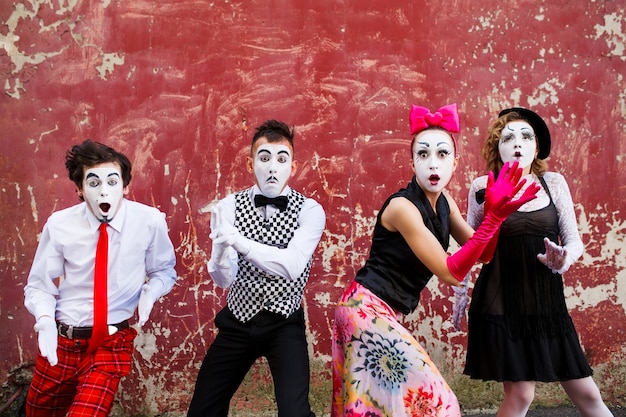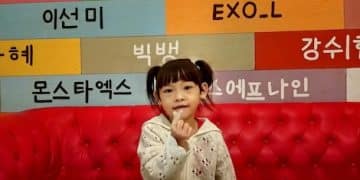Mastering Korean Slang from Dramas: 2025 Guide for US Viewers

Advertisements
Mastering Korean slang from dramas in 2025 involves understanding the evolving linguistic landscape influenced by pop culture, social media, and everyday Korean life, offering US viewers deeper cultural insights and a more authentic viewing experience.
Want to understand Korean dramas like a native in 2025? Mastering Korean slang from dramas: A guide to understanding common phrases and expressions in 2025 can unlock a whole new level of enjoyment and cultural understanding.
Anúncios
Why Learn Korean Slang from Dramas?
Korean dramas, or K-dramas, have exploded in popularity around the world. They offer a glimpse into Korean culture, lifestyle, and, of course, the language. But watching dramas can be even more rewarding if you understand the slang used by characters. It’s the key to truly grasping nuances and cultural references.
Slang is the ever-evolving vocabulary of everyday life. It reflects social changes, trends, and the way people actually communicate. While formal Korean is important, understanding slang bridges the gap between textbook learning and real-world conversation.
Anúncios

The Benefits of Understanding Slang
- Enhanced Comprehension: Understand unspoken subtexts and cultural jokes.
- Deeper Connection: Relate more authentically to characters and their stories.
- Cultural Insight: Gain a more profound understanding of Korean society.
By learning slang, you’re not just memorizing words; you’re unlocking deeper cultural insights, enabling a more profound engagement with both the language and the narratives presented in K-dramas.
Essential Korean Slang Terms for 2025
Slang changes quickly. Keeping up with the latest trends is essential. Here are some essential Korean slang terms expected to be popular in 2025 when watching dramas.
These terms and phrases represent current trends and are likely to remain relevant, although some may evolve by 2025. So it’s important to stay updated.
Common Slang Phrases
- 인싸 (Inssa): Someone who is popular and well-connected.
- 핵인싸 (Haek Inssa): An extremely popular person.
- 갑분싸 (Gapbunssa): Short for “갑자기 분위기 싸해진다” meaning “the atmosphere suddenly became awkward.”
- ㅇㄱㄹㅇ (Ogreo): An abbreviation for “이거 레알” (Igeo Real), meaning “This is real” or “For real.”
Understanding the contexts of these phrases—when and how they are used—can provide nuanced cultural insight, crucial for genuine comprehension rather than rote memorization. These terms reflect social status, reactions, and ways of emphasizing authenticity in conversations.
Slang Related to Pop Culture and Internet
The internet and pop culture have a huge influence on slang. K-pop, social media, and online communities all contribute words and phrases to the ever-growing slang dictionary.
From common exclamations used by streamers to references in popular songs, online slang permeates much of everyday conversation in Korea.

Slang from Online Communities
- ~irl (~이얼): Added to other English loan words to mean “in real life”.
- 롬곡옘몲 (Romgok Yemmeop): A playful misspelling of “눈물” (Nunmul), meaning “tears” to express sadness comically.
- 할미/할배 (Halmi/Halbae): Calling oneself an “grandma/grandpa” to express that you feel older than the younger generation and can’t follow their trends. Can also be used to tease someone else.
Internet slang is particularly important because it’s often used humorously or ironically. Using these terms correctly can demonstrate to Koreans that you are not only fluent but culturally aware.
Slang Reflecting Current Trends
Trends play a crucial role in shaping slang. Being aware of ongoing social, cultural, and technological developments can really level up your language game.
Slang reflects a society’s shifting values, attitudes, and concerns. Understanding current trends means you’re not just absorbing words, but getting to know the mood of the nation.
Slang From Social Issues
- 소확행 (Sohwakhang): Short for “소소하지만 확실한 행복” (Soso hajiman hwakshilhan haengbok), meaning “small but certain happiness”.
- 만반잘부 (Manbanjalbu): A сокращние abbreviation of “만나서 반가워요, 잘 부탁드립니다” (Mannaseo bangawoyo, jal butakdeurimnida), meaning “Nice to meet you, please take good care of me.” Often used in online communities.
Slang related to social issues often carries a lot of weight and emotion. Whether it’s about expressing small joys or seeking to connect in digital landscapes, acknowledging these nuances can have a great impact. Keep your eye out for similar terms that become central to public discourse in the future.
How to Learn Slang from K-Dramas Effectively
Absorbing slang from K-dramas requires more than passive watching. A strategic approach can greatly enhance your learning experience.
The first step is to choose dramas that are contemporary and reflect modern Korean life. Historical dramas or those set in specific subcultures might not expose you to the type of slang you’d hear in everyday conversations.
Useful Techniques for Learners
* **Active Note-Taking:** Keep a dedicated notebook to jot down new slang terms as you come across them in dramas, along with contextual notes and example sentences.
* **Subtitles Usage:** While subtitles are great, try watching scenes multiple times — once with subtitles to contextualize words and then once without to test comprehension.
* **Language Partner:** Share the journey with a language partner and discuss new slang that you learn, challenging each other to use the terms correctly in conversation.
Don’t just memorize the basic definitions of the phrases. Learn to use them with the appropriate intonation and in the right situations. This will prevent you from sounding awkward or out of place.
The Future of Korean Slang and Dramas
Slang will continue to evolve, influenced by digital culture, globalization, and youth trends. Korean dramas will continue to adapt, integrating new slang into their scripts.
It’s impossible to predict every new slang term. However, familiarity with the trends and cultural influencers that drive these changes will help you make educated guesses.
| Key Concept | Brief Description |
|---|---|
| 🎭 Essential Slang | Common slang for general use, like “Inssa.” |
| 💻 Internet Terms | Slang derived from online communities, such as “~irl”. |
| 🌟 Pop Culture Influence | Expressions influenced by K-pop, shows, and trends. |
| 📚 Learning Tips | Use of note-taking and comprehension testing. |
FAQ
▼
Slang provides deeper cultural context and enhances comprehension beyond formal language. It helps viewers understand nuances, jokes, and social undertones present in K-dramas.
▼
Originate from various sources, including internet communities, pop culture, social media trends, and everyday spoken language, reflecting the dynamic nature of Korean society.
▼
Note-taking during viewing, repeated viewings with and without subtitles, and practicing with language partners are effective techniques.
▼
“Inssa” refers to someone who is popular, outgoing, and well-connected in social circles, reflecting a high social status within Korean society.
▼
Internet slang introduces new expressions and abbreviations into K-dramas, making the dialogue sound more relevant and up-to-date with current conversations online.
Conclusion
Mastering Korean slang from dramas: A guide to understanding common phrases and expressions in 2025 is not just about memorizing words. It’s about immersing yourself in Korean culture, understanding societal trends, and connecting with others in a meaningful way. Use this guide as a starting point and embrace the journey of discovering the fascinating world of Korean slang!





